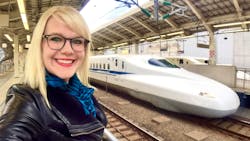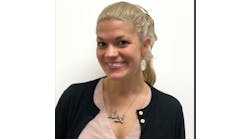One word to describe yourself: Courageous
Alma Mater: San Jose State University; Northern Kentucky University
Fun fact about yourself: I’m an adventure-seeker and enjoy taking long-distance rail odysseys. My longest journey was exploring seven countries by train in one month..
Favorite station or stop that you have ever visited or frequent (and why): My favorite station is any rail station with thoughtfully designed wayfinding, seamless transfers and reliable, working escalators. Topping that list is Berlin Hauptbahnhof, Zürich Hauptbahnhof and Gare de Lyon Part Dieu.
Favorite station or stop that you have ever visited or frequent (and why): I recently traveled on AVE high-speed rail in Spain, including a 1,100-km cross-country journey from Seville to Barcelona via Madrid. This route would typically take over 11 hours by car; AVE reduced travel time in half to 5.5 hours. The reason Spain invested in high-speed rail 30 years ago is similar to the reason the United States is pursuing it today: congestion on existing rail lines that are shared by passenger and freight trains, which impacted reliability of conventional passenger rail.
The passenger experience on AVE was top notch, from easy wayfinding to sleek, comfortable carriages and inclusive ticket pricing for every budget, which makes taking the train an easy choice over driving or flying. AVE also includes a ticket for local public transport at the origin and destination cities, which makes for seamless transfers the day of travel. The frequencies and reliability of AVE left a lasting impression, complete with beautiful scenery across arid canyons, northern mountains, and lush fields of sunflowers and olive trees.
Paige Malott founded Cascadia Rail, an advocacy organization supporting Washington Gov. Jay Inslee’s plan for building high-speed rail in the Pacific Northwest. She has served as chair of the organization for four years and presented at international conferences, including: Railvolution, Microsoft High Speed Rail Summit, APTA High Speed Rail Conference, Fundación Caminos de Hierro Conference, North American Infrastructure Leadership Forum, Association of Consulting Engineering Companies (ACEC) and Association of Transportation Law Professionals (ATLP).
Her research has guided federal delegates to recommend international best practices for U.S. intercity rail, with contributions to the Bipartisan Infrastructure Law and the American High Speed Rail Act. Locally, she has worked with the business community and Washington state legislature to secure $150 million in matching funds for the state to apply for federal high-speed rail grants.
Malott brings 15 years of practice creating digital communications strategies for passenger rail. She has worked with Massachusetts Institute of Technology, Downtown Seattle Association, Seattle DOT and Amazon.com, among other organizations. She brings significant experience with researching and analyzing policy, project challenges and community sentiment to develop written and visual content. Malott integrates digital strategies into traditional communications plans, including social media strategies with measurable results, as well as research articles, website design, video and photography. Malott is skilled in creating owned media to build public support of projects and address reputational challenges. Her work has been published in several national outlets: Eno Center for Transportation, Mineta Transportation Institute, American City Business Journals, PBS, E. W. Scripps, Sinclair Broadcast Group, Amazon.com and The Urbanist. Additionally, her research was selected for publication in two academic journals: Springer Proceedings in Business and Economics and Annals of Entrepreneurship Education & Pedagogy, Volume 5.
In addition to her work in transportation, Malott is an educator and adjunct instructor for the MIT Sloan School of Management Social Media Strategy online program. She has taught more than 500 executives and mid-career professionals from 48 countries about the neuroscience of social media and advanced marketing strategies.
Malott serves on the planning committee for the APTA High Speed Rail conference. She taught stakeholders best practices for hosting events and creating diverse panels, developed the format of the programming and analyzed an audience survey on topics of interest. Using survey data, Malott developed content for three sessions and presented on two panels. The conference attracted more than 300 attendees and improved diversity participation with 52 percent women speakers and 37 percent speakers of color.
Malott is also a leader for building support of streetcar projects. She developed a comprehensive digital strategy to build awareness and stakeholder support for the Seattle Streetcar system and address challenges facing Center City Connector streetcar expansion. She worked directly with Downtown Seattle Association, Seattle DOT, city of Seattle and business stakeholders. Her efforts resulted in improved public perception, legislators granting full funding for the project and creation of a new sustainable revenue source for transit expansion.
Is there a specific experience that led you to where you are today?
My interest in passenger rail began over a decade ago in an unconventional way: through researching a transit system that spanned 16 miles and never carried a single passenger. As a formally-trained video producer holding a degree in electronic media, I was working on a PBS documentary about the abandoned subway in Cincinnati, Ohio. Through my research, I learned how the completion or failure of a transit system shapes the long-term viability of a city: how citizens access jobs, talent retention, economic growth and access to affordable housing.
Understanding how public perception swayed rail transit projects soon became the cornerstone of my career. I realized my skillset in digital communications was in need and could benefit the transportation industry. After working in the private sector, I started my own consulting practice where I provide research, create videos and social media strategies for transportation projects to bolster public support, specializing in high-speed rail and streetcar advocacy.
What do you enjoy most about your job?
I enjoy simplifying complex information to help a wide variety of people understand, support and advance a project. This ranges from working with legislators, businesses and community decision makers, to conversations with the general public. Transportation is one of those unique sectors that truly connects and benefits the lives of everyone in a region. Understanding what’s important to each group and creating educational materials tailored to their unique needs is essential in building a groundswell of support for a project. It’s rewarding when the work comes full circle: to hear someone quote a sentence from my research, guiding leaders to make good, data-based decisions to improve passenger experience or seeing excerpts from my work advance in policy and legislation.
Accomplishment you’re most proud of and why?
Creating great passenger experiences through big wins and small wins. The big wins are milestones that make headlines, such as opening service to the public or getting a major funding commitment for the next project phase. Small wins are more day-to-day, in the weeds accomplishments that make service great. This could be updating policy to reflect international standards for high-speed rail, making recommendations on station planning for seamless multi-modal connections or advising on wayfinding design improvements.
For example, I was delighted to celebrate the opening of the Cincinnati Streetcar, a New Start project I worked on, which overcame years of adversity and many political hurdles; and equally as excited to champion new data that emphasized the viability, economic and environmental benefits during the planning stages of the Cascadia high-speed rail project.
It’s important to celebrate both the big wins and the small wins as part of our success as it is our day-to-day efforts that culminate in game-changing outcomes for passengers.
Best advice/tip/best practice to share from your area of expertise?
Keep these three things in mind when navigating difficult times:
1) People will remember how you made them feel and how you show up in times of adversity.
2) Be generous with grace. Everyone is trying their best, even if it may not look like it.
3) Asking for what you need is one of the bravest things you can do.



